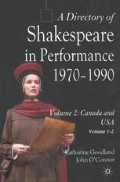Abstract
Bertram, as conceived by Mr. Kahn and played by Peter Thompson, was never established as anything of a prize. Mr. Kahn… stresses that Bertram was “from the country” and suggests that this fact accounts for a good deal of his behavior when “the girl from home” arrives at court; but it seems to unbalance the play to have this as an important factor, especially when the Countess his mother is played with the kind of nobility that Eva LaGallienne brought to the Part—a spirit that suggested that city and country are false distinctions in the case of aristocrats who take the city and the court with them wherever they go… To see Bertram so insecure at the court may be to see him more “interesting”, but it makes him less real and certainly less attractive as an object of affection… [T]he Helena we saw was one who made it all too reasonable for Bertram to be less than enthusiastic about being served up to her on a platter. That this was so was a tribute to Roberta Maxwell’s acting, for she was able to achieve something I would have thought impossible—beating Julie Andrews at her own game. Here was the perfect girl scout leader: so clean, so resourceful, so clever, competent, and reliable. And so unbearable… A brilliant and brilliantly consistent piece of acting, but of an inadequate interpretation … All of this may indicate a very sour and negative response to the play; but in fact there was so much to enjoy elsewhere… that I would have recommended anyone to go to see it. Parolles seemed to me a very wrong view of the Part… and Joseph Mahers self-indulgent performance made it wronger … Miss LaGallienne’s Countess and Joseph Sommer’s King were exactly what Mr. Kahn’s notes said he wanted them to be—”mature, wise, loving people [who] understand what is true and good”… These were the kinds of performances that really anchor a production… In the spectacle (a superb costume for Miss LaGallienne, generally fine ones for the others) and in the profound consistency of the older characters (one should not forget Wyman Pendleton’s Lafeu), the stuff of romance was present. (Peter Smith, Shakespeare Quarterly 21 [1970]: 452–53)
Access this chapter
Tax calculation will be finalised at checkout
Purchases are for personal use only
Preview
Unable to display preview. Download preview PDF.
Copyright information
© 2010 Katharine Goodland and John O’Connor
About this chapter
Cite this chapter
Goodland, K., O’Connor, J. (2010). All’s Well that Ends Well. In: A Directory of Shakespeare in Performance, 1970–1990. A Directory of Shakespeare in Performance Series. Palgrave Macmillan, London. https://doi.org/10.1007/978-1-349-60041-0_36
Download citation
DOI: https://doi.org/10.1007/978-1-349-60041-0_36
Publisher Name: Palgrave Macmillan, London
Print ISBN: 978-1-349-60043-4
Online ISBN: 978-1-349-60041-0
eBook Packages: Palgrave Media & Culture CollectionLiterature, Cultural and Media Studies (R0)

